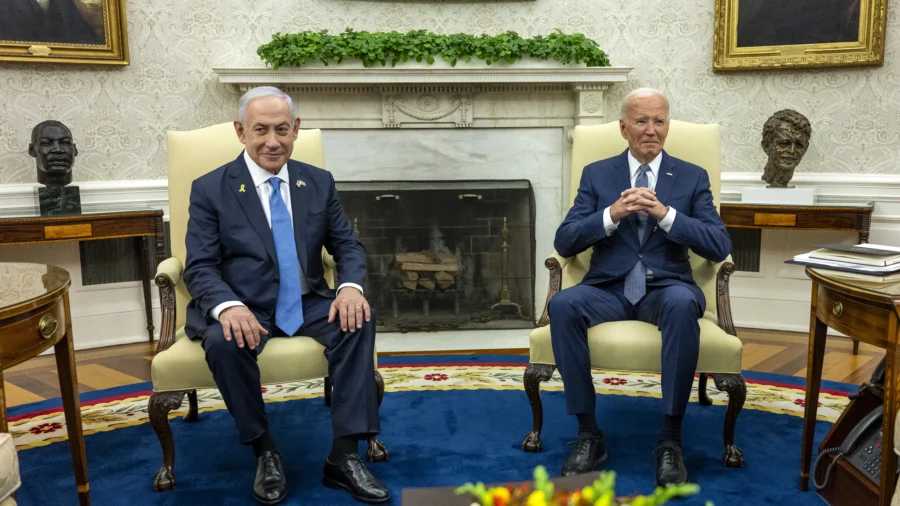President Joe Biden and Vice President Kamala Harris spoke with Israeli Prime Minister Benjamin Netanyahu on Oct. 9, as Israel weighs its response to the Oct. 1 Iranian missile barrage.
“The president affirmed his ironclad commitment to Israel’s security. He condemned unequivocally Iran’s ballistic missile attack against Israel on Oct. 1,” the White House said in a readout of the call.
At an Oct. 9 press briefing, White House press secretary Karine Jean-Pierre said the Biden administration has been in communication with Netanyahu’s government after the Iranian Islamic Revolutionary Guard Corps fired about 180 ballistic missiles at Israel.
Jean-Pierre said that “those discussions continued with the president and the prime minister” during the call.
The conversation is the first official call between Biden and Netanyahu since Aug. 21. Tensions across the Middle East have grown since their last conversation.
Since late August, efforts have stalled on a U.S.-backed proposal for a cease-fire to end the military conflict in the Gaza Strip and win the release of the roughly 100 hostages held by Hamas for the past year, only a fraction of whom are expected to still be alive.
The cross-border clashes between Hezbollah forces and Israel have also expanded in recent weeks, prompting the United States and other nations to step up efforts to evacuate their citizens from Lebanon.
Biden joined with several other nations on Sept. 25 in calls for Israel and Hezbollah to pause the fighting along the Israel–Lebanon border, to enable both sides to find a diplomatic off-ramp.
Netanyahu rebuffed those calls to halt the fighting in Lebanon and said that the Israeli military would “continue fighting with full force.”
An Israeli airstrike killed Hezbollah leader Hassan Nasrallah on Sept. 27 in Beirut, Lebanon.
By Oct. 1, Israeli ground forces had crossed into southern Lebanon.
The Iranian ballistic missile barrage occurred hours after the Israel Defense Forces formally announced their cross-border incursion into Lebanon.
The Iranian Islamic Revolutionary Guard Corps cited the Sept. 27 strike on Nasrallah and what it suspects was an Israeli-backed assassination operation in Tehran in July that killed Hamas political chairman Ismail Haniyeh, as reasons for launching the attack.
Within hours of the missile attack, Netanyahu vowed that Iran would “pay for it.”
While the Biden administration hasn’t precluded a response from Israel, it has urged restraint in the days since the attack.
“We don’t want to see any action that would lead to a full-blown regional war,” State Department spokesman Matthew Miller said at an Oct. 2 press briefing.
No clear Israeli retaliatory action has emerged following the Iranian missile barrage.
In addition to discussing the Iranian missile attack, the White House stated that Biden reiterated calls for a “diplomatic arrangement” to end the fighting between Israel and Hezbollah.
“The president affirmed Israel’s right to protect its citizens from Hezbollah, which has fired thousands of missiles and rockets into Israel over the past year alone, while emphasizing the need to minimize harm to civilians, in particular in the densely populated areas of Beirut,” the White House readout states.
According to the readout, Biden also urged renewed efforts to reach a cease-fire in the Gaza Strip.
The Associated Press contributed to this article.
From The Epoch Times

